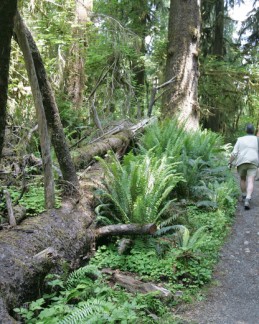Earth Day 2016

Olympic National Park is a UNESCO World Heritage Site and Biosphere Reserve. More subtly, but equally significant, its secluded Hoh Valley is of the very few remaining naturally quiet places in America, a place typically so free of noise pollution that you can hear a hemlock seed, about the size of a pinhead, fall 300 feet to the forest floor. What else can you hear? The bugling flutelike call of the Roosevelt elk, for which the park was first set aside to protect. Even the miles-distant drumming of ocean waves beating the pebbled shore may reach your ears in this soul-soothing, pristine natural amphitheater.
Tragically, that’s about to change if the U.S. Forest Service grants permission to the Navy to route its Boeing EA-18G Growler jets over Olympic National Park on electronic-warfare training exercises. These are the same military planes, flying in and out of the Naval Air Station Whidbey Island that have local residents protesting hazardous noise levels as high as 130 decibels.
Flying higher over Olympic National Park, the Growlers wouldn’t be nearly as loud, but they’d still be terribly detrimental. Flying as many as 260 days a year, eight to 16 hours a day, about a flight per hour, the jets would vanquish the park’s signature asset: its long stretches of natural quiet enjoyed by visitors and required by wildlife, such as the endangered Marbled Murrelet and Northern Spotted Owl.
Are these training exercises so urgent they need to violate the tranquil haven of a national park? Why, indeed, when about an extra 10 minutes of flight time could relocate these jets far from Olympic Park, sending them over the Army’s Yakima Training Center, 261,000 acres of land already impacted by military exercises.
Surely that would please Seattle resident John Knox, who enjoys hiking the park’s mountain trails and fishing in its backcountry lakes, savoring the quiet, the “biophony of the bugs and the birds all around me.” Knox, 32, who works at Growing Veterans, a Washington organization that employs sustainable agriculture as a transition tool for veterans, is himself still transitioning from his four-year service in the Marines, which saw him deployed to Iraq in 2004 with the 1st Light Armored Reconnaissance Battalion as a truck driver delivering supplies to the front lines.
Never in battle, Lance Cpl. Knox returned home in much better shape than many fellow veterans, but was affected nonetheless. “I have a service-connected disability of 10 percent hearing loss and 30 percent PTSD,” he says, explaining that to this day, the sound of military aircraft triggers flashbacks to Iraq and a “hypervigilant state.” The sound of Navy Growlers passing overhead on one of his trips to Olympic National Park “would psychologically remove me from the place I’m actually in, a regenerative, spiritually healing spot. There’s a place for military activity and also a place for these natural sounds to be heard unimpeded.”
“Why,” he asks, “should there be man-made sound and military sound over Olympic National Park?”
0